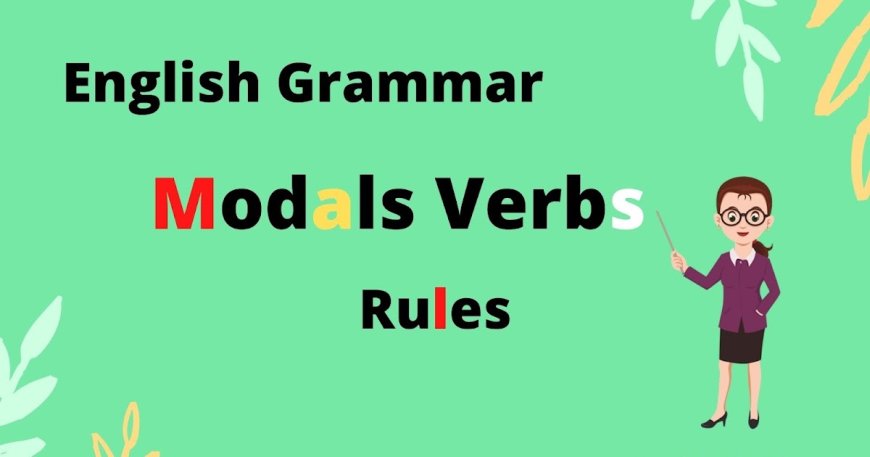Modals - Definitions, Uses and examples

Modals are a special group of verbs used to express ability, permission, suggestion, possibility, intention, etc. Modals modify the main verb in a sentence and help convey different shades of meaning and nuance.
The most commonly used modals in English are:
1. Can: It expresses ability, permission, or possibility. Example: "She can swim."
2. Could: It is the past tense form of "can" and is used to express ability or possibility in the past. Example: "I could run faster when I was younger."
3. May: It indicates possibility or permission. Example: "You may borrow my book."
4. Might: It expresses possibility or uncertainty. Example: "I might go to the party tonight."
5. Must: It indicates obligation or necessity. Example: "You must complete your homework."
6. Shall: It is used to express future actions or suggestions. Example: "Shall we go for a walk?"
7. Should: It expresses advice, recommendation, or obligation. Example: "You should eat healthy food."
8. Will: It indicates future actions or intentions. Example: "I will help you with your project."
9. Would: It is often used to express polite requests or to talk about hypothetical situations. Example: "Would you like some tea?"
10. Ought to: It expresses moral obligation or duty. Example: "You ought to apologize for your mistake."
Here is a list of some important modals with their uses and some examples:
|
Word |
Functions |
Examples |
|
Can |
To talk about ability To ask for and grant permission to do something in a friendly manner To talk about what we are allowed to do |
I can bat well. Can I borrow your colour pencils? Yes, you can. Dad says I can borrow his tie for tonight’s party. |
|
Cannot/ can’t |
To talk about inability To deny permission to do something To talk about what one is not allowed to do |
I can’t bat well. Can I borrow your colour pencils? No, you can’t borrow my colour pencils. Dad says I can’t borrow his tie for tonight’s party. |
|
May |
To seek and grand permission To talk about something that is possible To express wishes and blessings |
May I come in? Yes, you may. Rehan may like the pasta I’ve made. May your journey be a safe one. |
|
May not / mayn’t |
To refuse permission To talk about something that is possible |
May I come in? No, you mayn’t. Rehan may like the pasta but Abir may not. |
|
Should |
To politely talk about something that is not the right thing to do |
You should greet your elders every morning. |
|
Should not/ shouldn’t |
To politely talk about something that is not the right thing to do |
You shouldn’t be unkind to anybody. |
|
Must |
To express the absolute need to do something |
You must see a doctor at once or your wound will fester. |
|
Must not/ mustn’t |
To express the absolute need to do something |
You mustn’t ignore the wound you have. You must see a doctor immediately. |
|
Could |
To ask for permission To express an ability |
Could I leave a bit early today. I could help you out with this. |
|
Could not/ couldn’t |
To deny permission To express inability |
You couldn’t leave early today. I need you for some work here. I couldn’t help you out with this. |
|
Ought to |
To give a strong suggestion |
You ought to listen to her when she tries to confide in you about her trouble. |
|
Oughtn’t to |
To express the need to not do something |
You oughtn’t to be so late when you have a flight to catch |
|
Might |
To express a weak possibility |
I might turn up at the party after all. |
|
Might not/ mightn’t |
To talk about something that may not happen, in a weak manner |
Surbhi might not come for the picnic. |
-
Modals of Ability:
- Can: She can play the piano.
- Could: I could swim when I was younger.
-
Modals of Permission:
- May: May I use your phone?
- Can: Can I go to the party?
-
Modals of Possibility:
- Might: It might rain later.
- Could: We could win the game.
-
Modals of Obligation:
- Must: You must attend the meeting.
- Have to: I have to finish my homework.
-
Modals of Prohibition:
- Must not: You must not smoke in here.
- Cannot: You cannot park in that area.
-
Modals of Advice:
- Should: You should exercise regularly.
- Ought to: You ought to apologize to her.
-
Modals of Requests:
- Would: Would you pass me the salt, please?
- Could: Could you help me with this?
-
Modals of Intention:
- Will: I will visit you tomorrow.
- Shall: Shall we go for a walk?
-
Modals of Certainty:
- Will: She will definitely win the competition.
- Must: It must be raining outside.
-
Modals of Deduction:
- May: He may be busy right now.
- Might: They might have already left.
Practice the use of common modals with the help of the phrases:
Can/ can't
- see clearly
- play football
- speak english
- fly kite
- drive car
- climb a mountain
Must/ mustn't
- obey traffic rules
- save water
- save electicity
- stop at red light
- buy stale fruits
- honk loudly
Should/ shouldn't
- think too much
- take rest
- do homework
- exercise regularly
- eat candies
- watch television etc.
What's Your Reaction?






















































